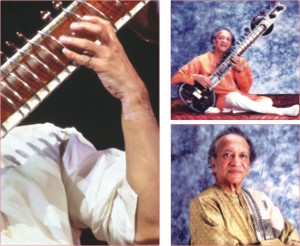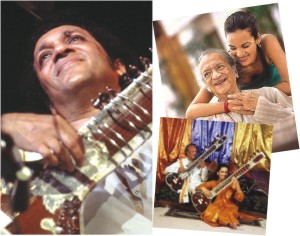Feature
Ravi Shankar- The Sitar Virtuoso
Nazia Ahmed
 RAVI SHANKAR, the legendary sitarist and composer is India's most esteemed musical Ambassador and a singular phenomenon in the classical music worlds of East and West. As a performer, composer, teacher and writer, he has done more for Indian music than any other musician. He is well known for his pioneering work in bringing Indian music to the West. This however, he did only after long years of dedicated study under his illustrious guru Baba Allaudin Khan and after making a name for himself in India. RAVI SHANKAR, the legendary sitarist and composer is India's most esteemed musical Ambassador and a singular phenomenon in the classical music worlds of East and West. As a performer, composer, teacher and writer, he has done more for Indian music than any other musician. He is well known for his pioneering work in bringing Indian music to the West. This however, he did only after long years of dedicated study under his illustrious guru Baba Allaudin Khan and after making a name for himself in India.
Always ahead of his time, Ravi Shankar has written two concertos for sitar and orchestra, violin-sitar compositions for Yehudi Menuhin and himself, music for flute virtuoso Jean Pierre Rampal, music for Hosan Yamamoto, master of the Shakuhachi and Musumi Miyashita - Koto virtuoso, and collaborated with Phillip Glass (Passages). George Harrison produced and participated in two record albums, "Shankar Family & Friends" and "Festival of India" composed by Ravi Shankar. He has composed extensively for films and Ballets in India, Canada, Europe and the United States, including Charly, Gandhi and Apu Trilogy. Ravi Shankar is an honourary member of the American Academy of Arts and Letters and is a member of the United Nations International Rostrum of composers. He has received many awards and honours from his own country and from all over the world, including fourteen doctorates, the Bharat Ratna, the Padma Vibhushan, Desikottam, the Magsaysay Award from Manila, two Grammy's, the Fukuoka grand Prize from Japan, the Crystal award from Davos, with the title 'Global Ambassador' to name some. In 1986 he was nominated as a member of the Rajya Sabha, India's upper house of Parliament. His recording "Tana Mana", released on the private Music label in 1987, brought Mr. Shankar's music into the "New age" with its unique method of combining traditional instruments with electronics.
Sitar is often thought of as related to the guitar, but it is much more difficult to master.
"Just like the violin or cello, or any other Western classical instrument, it takes a minimum of 8-10 years to get a good control on the sitar. Becoming a master and all that depends on your luck and how much talent you have. It takes many, many years of practice and learning and hard work." Shankar said. Even though he has played countless shows over his 68 years of performing, he still finds inspiration to perform.
"The music itself is an age old form. They go on adding in the form because most of it is improvisation. Personally I do more improvisation than others. So it is something which has an old format, old system, but we always give it new life, so it is such an exciting thing and inspiring as well."
Soon after Harrison took up an interest in Indian music and famously featured a sitar on "Norwegian Wood," he was introduced to Shankar. Later Harrison became Shankar's student and frequent collaborator until his death in 2001. However, Shankar was surprised the first time he heard the Beatles fuse rock and Indian music on "Norwegian Wood."
"My nephews and nieces told me about it. I had no idea about it, but when I heard it, it was alright. It was something different. Even then it sounded really strange because George never learned properly and had no experience," Shankar said.
Even though this fusion of Western and Eastern music brought Shankar and the sitar to prominence, he never intended for the two to be combined.
 "I never had anything in my mind like that. I was only anxious to give our music to the listeners in this country and it was such a great success that there was no need for me to think along those lines at all," Shankar said. "Of course, I have done a lot of experimental things myself, like recording with [violinist] Yehudi Menuhin and Jean Pierre Rampal playing the flute. And I have written two sitar concertos with a symphony orchestra. But it was more with Western classical music. I never attempted anything with rock or pop." "I never had anything in my mind like that. I was only anxious to give our music to the listeners in this country and it was such a great success that there was no need for me to think along those lines at all," Shankar said. "Of course, I have done a lot of experimental things myself, like recording with [violinist] Yehudi Menuhin and Jean Pierre Rampal playing the flute. And I have written two sitar concertos with a symphony orchestra. But it was more with Western classical music. I never attempted anything with rock or pop."
Shankar became interested in sitar at a young age, when he was a dancer. "I got involved when I was ten. I was a dancer touring with my brother, Uday, touring all over the world. When I was 15, a great Indian musician joined my brother's group as a soloist. After that I seriously started practicing sitar from him." He is the father of singer Norah Jones and sitarist Anoushka Shankar, who were born in 1979 and 1981 to Sue Jones and Sukanya Shankar respectively.
His respect in the music community has resulted in many titles, including "The Godfather of World Music" by Harrison. However, he does not seem to have let his fame go to his head.
"Well I've been given so many titles at so many times, 'The Ambassador of Indian Music,' 'The Godfather' by George. It's nice to hear but it doesn't change me or my music. I might feel happy to hear it but the main thing is that I've been able to bring the music to this country and that makes me very happy."
As one of music's pioneers and most respected performers, he is happy with his accomplishments and his place in history.
"My greatest accomplishment is so hard to tell you myself. I think I feel that I have been able to translate, or bring Indian music into this country and the Western world and was the first person to be able to make people understand it. And that makes me very happy."
In an interview with the Rediff mail India Pundit Shankar was asked: “Even in music, classical music at that, politics has sneaked in. What do you feel about it”
“Politics has always been there. All over the world I have watched the competitive spirit grow over the years. Jealousies, groupings, arguments. There are those who like Menuhin the best. There are others who swear by David Oistra or Milstein. It is natural to have your favourite actor or actress or musician or composer. But India is the only place where we fight over it. Where people try to prove that their favourite is better than the rest. It is like saying my father is better than your father and fighting over it. You should be convinced about it and keep it in your heart. It is not something to fight over in public. Everybody has a right to like or dislike anything or anyone. From a flower to a flavour to a book or a composition but it is very sad that in our country we actually fight over such things in an unseemly manner.
“Ravi Shankar has brought me a precious gift and through him I have added a new dimension to my experience of music. To me his genius and his humanity can only be compared to that of Mozart”- Yehudi Menuhin.
Source: Internet
| 